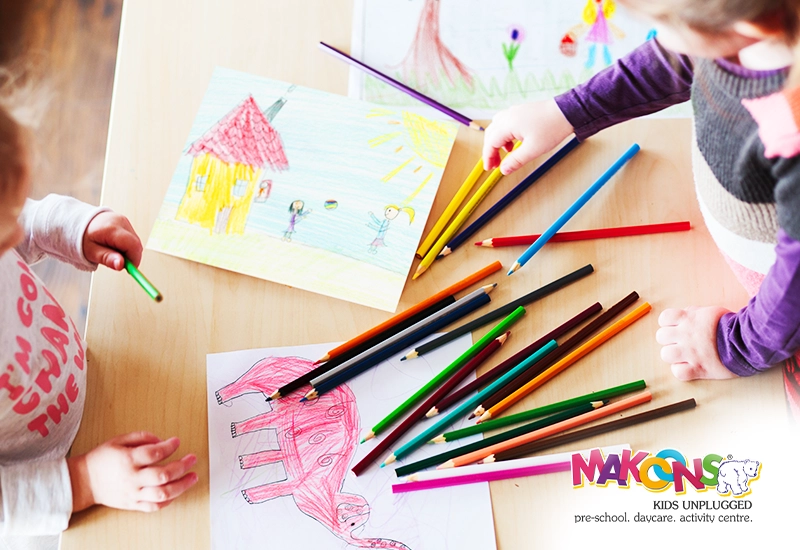A child’s formal educational journey begins when they join a playgroup. Without sacrificing the enjoyment that comes with childhood, it is where young children experience structure, discipline, and education for the first time. However, a lot of parents frequently ponder: What precisely ought to be covered in a play group syllabus? If you are one of those parents, this thorough guide will assist you in comprehending the essential elements of an Indian play school curriculum that is well-balanced.
Why the Play Group Syllabus Matters?
Playgroup is structured play with a purpose, not just play. The main goal is to allow a child’s social, emotional, and cognitive development while getting them ready for preschool. A well designed playschool structure allows development that is the necessary for the child age Through engaging and productive interactive activities
Understanding Early Childhood Education Syllabus
The main goal of early childhood education is the development of the whole child .This also involves providing a range of interactive, sensory-rich, and capitative type experiences to promote the development of the body, mind, and emotions as well.
This is a thorough explanation of what should be taught in playgroups, which are the core of the Indian play school curriculum.
- Proficiency in Language and communication.
A significant portion of the play group curriculum is devoted to language development. Youngsters are exposed to
- Basic vocabulary (fruits, animals, colors, etc.)
- Storytelling and rhymes
- Picture reading
- Listening and responding to simple instructions
- Name recognition
These types of exercises help in the development of early listening and string communication skills. To foster the art of language development, playgroup lesson plans also frequently include storytelling sessions, puppet shows, and entertaining games .
2. Pre-Math Concepts
Children acquire pre-math skills that serve as the basis for numeracy before numbers are formally introduced. These consist of:
- Sorting and matching
- Big vs small, more vs less
- Identifying shapes and patterns
- Counting from 1 to 10 using visuals and rhymes
Toys, flashcards, and interactive preschool learning activities are used to teach these ideas. Through play, it aims to teach kids how to recognise numbers and comprehend patterns.
3. Motor Skill Development
Both gross and fine motor skills are essential elements of an academic playgroup framework. Included in the syllabus should be
- Threading beads, scribbling, clay molding for fine motor skills
- Activities like Jumping, hopping, balancing, and climbing for development of gross motor development
- Coordination of hand and eyes through block building and puzzles .
Frequent exercise allows the development of strength, control, and coordination—all of these are so important for a child’s developing body.
4. Social and Emotional Learning
Skills taught in playgroup go far beyond academics. The curriculum focuses on:
- Sharing and taking turns
- Expressing emotions appropriately
- Following basic rules
- Cooperating with peers
Through activities like circle time, group games , children learn empathy and teamwork. The foundation for future classroom relationships and behaviour is laid by social development.
5. Art and Creative Expression
An integral component of early education is creativity. Lesson plans for playgroups frequently consist of:
- Finger painting and sponge dabbing
- Collage making and paper tearing
- Crayon coloring and freehand drawing
- Simple craft projects using safe materials
These types of exercises improve coordination and hand strength while using self-expression and imagination.
6. Music and Movement
In playgroup settings, music and movement go hand in hand. Since children are drawn to motion and rhythm by nature, this is a useful teaching tool.
- Singing rhymes with actions
- Dancing to nursery music
- Playing simple and easy musical instruments like shakers
This promotes body control and auditory development. Additionally, it’s a fantastic method of teaching language, sequence, and memory in an enjoyable way.
7. Environmental Awareness and General Knowledge
Children’s nursery topics frequently include foundational ideas that aid in their understanding of the world. This comprises:
- Days of the week, weather, seasons
- Animals and their sounds
- Plants and flowers
- Family members and helpers in the community
The ultimate goal is to pique children’s interest and also help them to relate with real world situations. You can use flashcards, actual objects, field trips, and role-playing exercises to teach these.
8. Self-Help and Life Skills
Basic life skills that promote independence are incorporated into a well-designed play group syllabus. Among them are:
- Washing hands
- Putting on shoes
- Packing their bags
- Eating independently
Teaching self-help skills to children helps them boost confidence and also prepare them for the daily schedule routine.
9. Exploration and sensory play
All five senses must be used in preschool learning activities. Any playgroup curriculum must include sensory play:
- Water and sand play
- Texture boards and tactile trays
- Smell-and-guess games
- Sound boxes and visual stimulants
These activities develop cognitive connections and promote experimentation.
10. Celebrations and Thematic Learning
A lot of playgroup lesson plans are based on monthly themes, like:
- Colors of the month
- Festivals and cultural days
- Nature and animals
- Family and community
Learning can become interesting and new by adding holidays and themed weeks. It also helps in presenting ideas in a fun and a very relatable way.
How to Choose the Right Play School Curriculum in India?
Make sure that the curriculum you are choosing covers every facet of early childhood education.
Enquire about:
- Daily routines and lesson plans
- Different Learning materials and methods of teaching
- Qualification of Teacher and student ratios
- How school keeps a record of progress and how to communicate it .
- In a balanced curriculum ,Academics, emotional health, and creativity should all be given equal weight .
Final Thoughts:
A Foundation for Lifelong Learning
Parts from the alphabet and numbers , There is more to a well-crafted play group syllabus. It’s mainly about creating an environment where kids can grow mentally and physically, express themselves, trust, and explore. These skills that are taught in a playgroup serve an important role for achieving success in future ..
With the correct beginning when you know what to teach in a playgroup as a parent to help your child learn at home and at school turns learning into a joyful journey rather than a chore.
Read Also : Play School Admission Age: A Complete Guide for Indian Parents
What kinds of things do kids normally learn in a playgroup?
A well-rounded playgroup syllabus has activities for language development, fundamental math concepts, motor skills, music and movement, storytelling, arts and crafts, and games that help kids engage with each other.
How can a playgroup curriculum make learning fun?
Playgroups use a play-based approach with songs, games, visual aids, toys, and hands-on activities that help kids learn by having fun and exploring.
Is it important for kids in playgroups to learn things in school?
At this point, the focus should be on building pre-academic abilities like listening, paying attention, talking, and coordinating movements instead of formal academics.
What can parents do at home to help with the playgroup curriculum?
Parents can help their kids learn in a comfortable way by reading stories, doing easy puzzles, singing rhymes, and chatting to them constantly.
What should I look for in a playgroup for my child?
Find a playgroup that focuses on the whole child, has a structured but flexible curriculum, trained staff, safe infrastructure for kids, and good ratings from other parents.
How often do playgroups undertake assessments?
Formal tests are not usually given in playgroup. Teachers do, however, keep an eye on and document each child's developmental milestones to keep track of their growth.
What part do stories and rhymes play in the playgroup curriculum?
Storytelling and rhymes help young kids learn new words, listen better, use their imaginations, and express their feelings, which are all important parts of early development.


